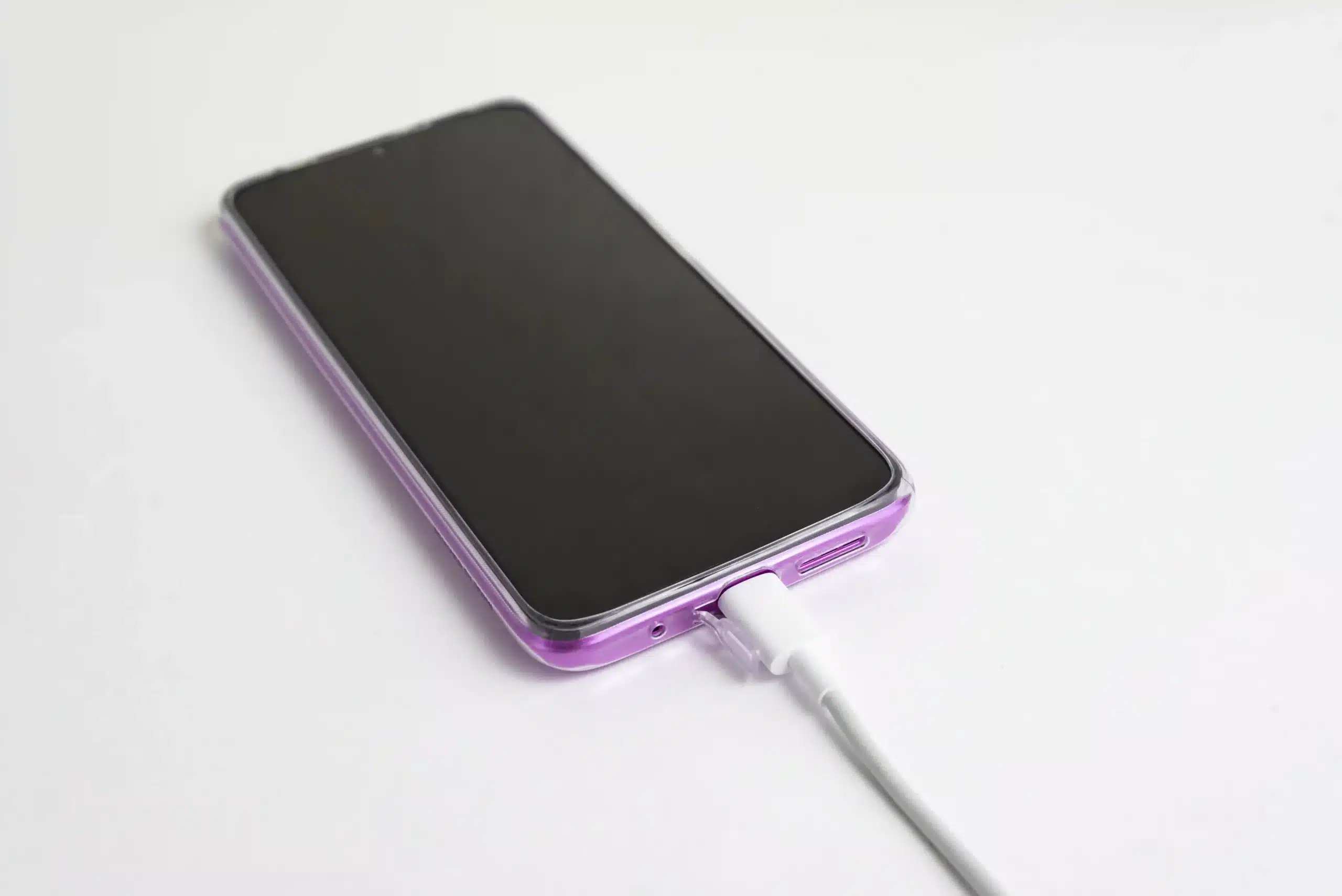Is charging your phone overnight bad for your device’s battery life? The question becomes increasingly relevant as our smartphones have become our essential daily companions, on which we rely from morning to night. While newer phones do come with built-in overcharging protection, keeping your phone plugged in to charge for 8+ hours every day can still have long-term effects on your battery function.
Your charging habits directly determine how long your phone battery will last. This guide explains whether you should charge your phone overnight, the pros and cons of this common practice, and practical advice for safe overnight charging routines.
Understanding How Phone Charging Works
Lithium-ion batteries are rechargeable power storage units that use lithium compounds to hold electrical energy, so they’re ideal for mobile phones since they are lightweight and have a high energy capacity. These batteries work through cycles of charging, where lithium particles move between two electrodes inside the battery structure. When you use your phone, the particles travel from the graphite anode to the lithium oxide cathode, creating an electrical current that runs your device.
Connecting your charger causes these particles to flow back to the anode, which restores the battery’s stored energy. Your cell phone also has built-in safety features, including charge controllers, voltage sensors, temperature monitors, overcharge protection, and current regulation that provide safe operation for everything. These protective features prevent problems before they happen.
Is Charging Your Phone Overnight Safe?
It’s usually safe to charge your phone overnight because of advanced smartphone technology that prevents overcharging. When your phone reaches 100%, the charging system will automatically stop to protect your battery. Your phone then enters “trickle charging” mode and provides small amounts of power at set intervals to maintain the full charge as the battery depletes naturally. This trickle charging generates even more heat and stress on your battery, which eventually shortens its lifespan in the long run.
Major smartphone manufacturers like Apple and Samsung have made official statements about overnight charging practices. Samsung says, “Your phone’s battery will not be at risk of overcharging if you leave it plugged in overnight” because smart charging technology stops the process once full capacity is reached. Apple states, “iPhones employ smart charging features that make overnight charging safe, but prolonged periods at full charge do affect battery health.”
However, there are still some risks, like overheating while charging on soft surfaces or in hot climates where heat cannot dissipate properly. Power surges from malfunctioning chargers destroy your phone’s internal components, and battery aging occurs because lithium-ion batteries perform most efficiently at 20-80% rather than maintaining a full charge.
The heat generation caused by constant trickle charging wears down the battery faster. Both companies have implemented protective functions to solve these issues, with Apple providing delayed charging after 80% and Samsung providing options to limit charging at 85%.
Pros and Cons of Overnight Charging
Overnight charging of your phone has become a common practice among smartphone users globally. The practice has both beneficial advantages and some worrying disadvantages that every phone user should be aware of.
Pros
- Convenience: Plugging your phone in at night is convenient and fits well with your busy lifestyle. This allows you not to have to worry about finding time to charge during the day.
- Ensures a full battery in the morning: Waking up with a 100% battery charge means that you’re prepared for whatever activity the day holds. This full charge provides a safety buffer for full-day use, long workdays, or emergencies when plugging in just isn’t possible.
- Built-in safeguards minimize risk: Smartphones today are equipped with smart charging protections that recognize when to stop sending power to your battery. These built-in systems reduce the risk of harm from excessive charging.
Cons
- Gradual battery health decline over time: Leaving your phone plugged in all night keeps the battery at its highest stress level for hours at a time. The more often you do this, the faster your phone’s ability to hold a charge will weaken over the months or years.
- Potential heat buildup: While charging, your phone naturally produces heat that must have an escape route. Having your phone under blankets, pillows, or thick cases traps this heat, causing temperatures to rise to dangerous levels.
- Energy waste: Your phone keeps drawing electricity from the wall even after it reaches 100% charge. This frequent energy drain adds more dollars to your monthly electric bill and wastes energy.
Debunking Common Myths
Phone battery health affects the amount of time your device stays charged throughout the day. With so much conflicting information on the internet, it’s easy to get confused. Here are the most common myths about batteries and what you need to know instead:
Charging overnight causes explosions
Phone explosions are extremely uncommon and rarely happen from overnight charging. If phones do have battery problems, it’s more likely to be because of defective parts inside the phone or using faulty charging cables. New smartphones have safety features that prevent dangerous overheating when your phone charges throughout the night.
You must charge from 0 to 100% each time
This is old advice that’s only applicable to older battery designs and can actually damage modern lithium-ion batteries. Letting your battery hit 0% regularly puts extra stress on the internal components and shortens its overall lifespan.
Leaving the phone plugged in “kills” the battery quickly
Is it bad to charge your phone overnight? Not really, since today’s smartphones automatically stop charging once they reach full capacity. Your phone will maintain that 100% charge with tiny top-ups as the battery naturally drops, which causes minimal wear compared to normal daily use. However, it’s good to turn on optimal charging settings in order to protect your phone.
Tips for Safe Overnight Charging
If you want to prevent your phone from overheating and battery burnout, follow these safety tips we’ve put together:
1. Use Certified Chargers
Original chargers come with safety certifications from reputable organizations, such as UL, CE, or FCC, which ensure they meet electrical safety standards. Brands like Apple, Samsung, and Google are designed to prevent power surges and overheating. Cheap knock-offs and counterfeit chargers often lack these safety measures and contain low-grade components that may fail at any moment. These unreliable chargers can deliver unstable voltage levels, overheat your phone, or even cause electrical fires.
2. Don’t Charge Under Pillows or Bedding
Your phone heats up when it charges, and the heat has to go somewhere. When you put your phone under pillows or mattresses, the heat gets trapped and builds. This can damage your phone’s battery or start a fire. Always leave your phone uncovered in an open area where air can flow freely around it.
3. Use “Optimized Battery Charging”
Smart charging technology studies your daily habits to protect your battery’s long-term health. This feature deliberately slows down charging once your phone reaches 80% capacity. The system then waits until shortly before your usual wake-up time to complete that final 20% of charging.
4. Place The Phone On a Flat, Cool Surface
Hard surfaces like nightstands, dressers, or desks are ideal for charging overnight because they don’t heat up. These surfaces also keep your phone stable and prevent it from falling or getting damaged. If your phone gets hot during charging, take off its case so that it can cool down.
Battery Health: Long-Term Impacts
Batteries don’t last forever and become less effective as months and years go by. Things like charging frequency, what apps you use, and even room temperature can speed up or slow down this process. Here are the main factors that affect your battery’s long-term health:
Understanding battery degradation
Battery degradation means your phone’s battery loses its ability to hold as much power as it could when it was brand new. This decline happens because the internal parts of the battery wear down from repeated charging cycles. Each time you use up 100% of your battery’s capacity, you complete one charge cycle. Most modern phone batteries can handle around 500 to 800 complete cycles before they start showing noticeable capacity loss.
Signs your battery health is declining
A declining battery shows clear warning signs that become hard to ignore during daily phone use. Your phone will start dying much quicker than usual, forcing you to charge it multiple times throughout the day instead of once. The device might also turn off without warning, even when the screen shows plenty of battery left, especially when running demanding apps or games. You may notice your phone feels warmer than normal during basic tasks like browsing or texting.
Alternatives to Overnight Charging
Instead of charging your phone while you sleep, there are better methods that protect your battery’s health. These approaches give you more control over the charging process and help extend your device’s lifespan:
Charging in the evening
Plug your phone in during your evening downtime when you’re watching television or relaxing at home. This method allows you to monitor the charging progress and disconnect the device once it reaches full battery, preventing overcharging that can happen during overnight sessions.
Charging in the morning
Another alternative is to charge your phone during your morning routine before starting your day. Modern smartphones can gain significant power in just 30 to 45 minutes while you take a shower, eat breakfast, or get dressed for work.
Portable battery packs and wireless chargers
External power sources offer great flexibility for maintaining your phone’s battery throughout the day. Power banks save the day when you’re away from electrical outlets, while wireless pads need no cables. These options help you avoid depending on long overnight charging sessions completely.
What Experts and Manufacturers Recommend
Leading smartphone manufacturers have developed specific methods to help users charge their phones safely. Here are the key recommendations from leading manufacturers:
1. Apple’s Optimized Battery Charging
Apple recommends having Optimized Battery Charging enabled to maintain your device’s long-term battery health. They suggest allowing the system to learn your daily charging routine rather than overriding it frequently. Apple advises users to charge overnight consistently, so that the feature can work as intended. Additionally, Apple recommends setting charge limits between 80-100% on newer iPhone models for additional battery protection.
2. Google Pixel’s Adaptive Charging
Google created Adaptive Battery to manage power based on your app usage habits. The system gives more battery power to the most frequently used apps while limiting power for less frequently used apps. Your Pixel phone takes about a couple of weeks to fully learn your daily habits after setup. You can also customize these settings for individual apps.
3. Samsung’s Battery Care Tools
Samsung advocates for good charging habits and proper battery storage for a long life. They recommend charging your battery above 50%, as lithium batteries function more efficiently this way. Using authentic Samsung chargers protects your device and charging components from damage.
Key Takeaways
While overnight charging won’t destroy your phone thanks to built-in safety features, understanding proper charging habits can help you get the most out of your device’s battery life. The real challenge isn’t whether to charge overnight, but recognizing when your phone’s battery performance starts declining and knowing where to get reliable help.
If your phone dies faster than usual, overheats during charging, or shuts down unexpectedly, these are clear signs your battery needs professional attention. Bring your device to 911 Phone Repair, where we offer no-cost evaluations and expert fixes for phones and tablets, with everything backed by our warranties and decades of repair experience.



